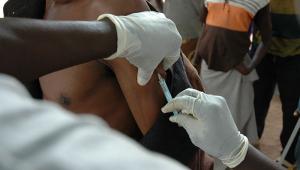A coalition of governments, businesses and philanthropists has pledged $460m to create vaccines to halt diseases before they can spread.
The Norwegian, Japanese and German governments joined forces with the Wellcome Trust and the Bill & Melinda Gates Foundation to launch the Coalition for Epidemic Preparedness Innovations at the World Economic Forum in Davos, Switzerland, this week.
The programme will channel money to research and develop vaccines that can be rapidly deployed to combat infectious diseases affecting low and middle-income countries. It is hoped this will contain the spread of diseases before they become global health emergencies.
Billed as “an insurance policy against epidemics”, Cepi will initially target lassa, mers and nipah viruses, which have transitioned from animals to humans and are considered to pose a serious threat of a global epidemic.
It is hoped this will plug a gap that exists because pharmaceutical companies are reluctant to develop medicines for countries that are less well off.
One of Cepi’s key aims is to shorten the time it takes to develop vaccines against diseases that suddenly emerge, such as zika fever last year. Vaccine development can take many years because it involves a lengthy process of testing and ensuring legal compliance.
The outbreak of ebola in west Africa in 2014 quickly spiralled out of control, reaching epidemic proportions. Figures suggest that more than 11,000 people died as a result of the crisis, which devastated the healthcare systems and economies of Sierra Leone, Guinea and Liberia.
The episode revealed serious flaws in the ability of global organisations to respond to the spread of contagious diseases, with the World Health Organization drawing particular criticism.
Bill Gates, co-chair of the Bill & Melinda Gates Foundation, said: “Ebola and zika showed that the world is tragically unprepared to detect local outbreaks and respond quickly enough to prevent them from becoming global pandemics. Without investment in research and development, we will remain unequipped when we face the next threat.”
He added: “The ability to rapidly develop and deliver vaccines when new, ‘unknown’ diseases emerge offers our best hope to outpace outbreaks, save lives and avert disastrous economic consequences.”
The $460m pledge will provide nearly half of the $1bn required for the first five years of the scheme. Cepi is now calling for proposals from researchers and companies around the world to support the development of vaccines against its first target diseases.













